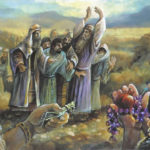
The story of the spying of the promised land is initially recounted in Numbers 13-14, which as we have already seen is a composite text of the Yahwist and later Priestly traditions (see Contradictions #233, #234, #235-236, #237, and #238-240). When we say “composite text,” we mean that the text/story in the form that it has come to us modern readers is composite in nature; it is composed of two onceRead More